Doorstep milk round revived by dairy farm selling direct
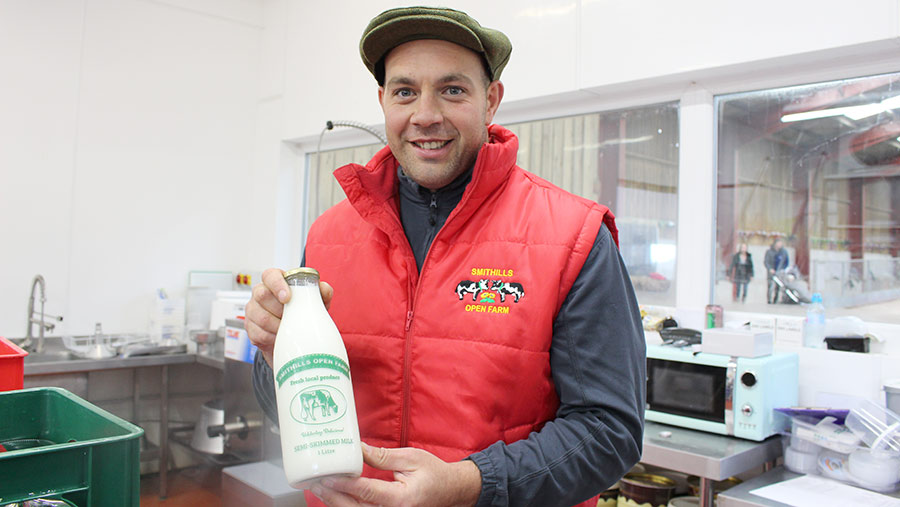
When dairy farmers Anthony and Carl Grimshaw, and Carl’s partner Louise Blundell, sat around the kitchen table last October to discuss taking on a milk round, they never dreamed that a year on they would have eight milk rounds and more than 1,700 customers.
It had always been an aim at Smithills Open Farm to sell milk direct to customers – either through the shop on their Open Farm, which attracts more than 150,000 visitors a year, or by doorstep delivery.
So, when the opportunity came up at the end of last year to buy a milk round with 200 customers in the local Smithills and Heaton area of Bolton, they decided to go for it.
See also: Advice on successful farm diversification
Growing the business
They had been processing milk on demand for sale in their shop before that and at most were bottling 200 litres every other day.
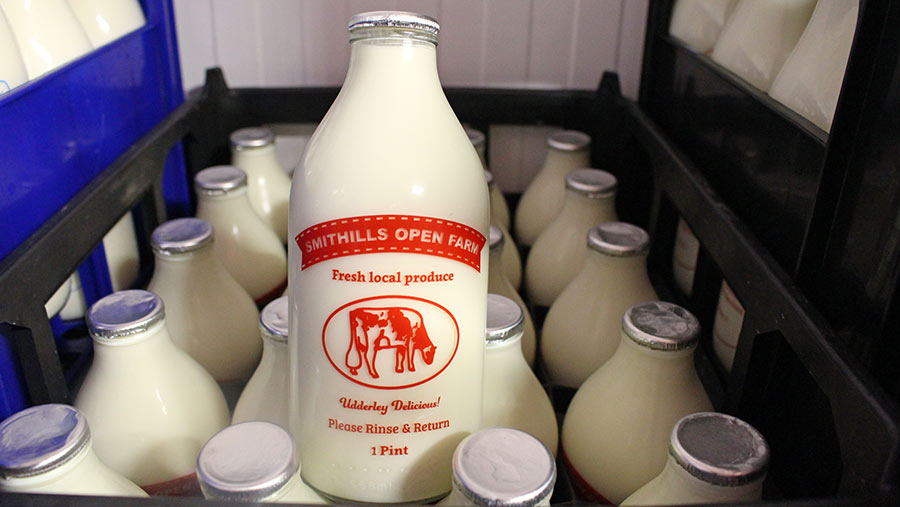
However, in the first week in January, a single post advertising the milk round on their Facebook page changed things overnight.
Carl says: “The phone just never stopped ringing.
Milk round facts
- Six of the milk rounds take four to five hours starting at 3am and finishing at 8am. The other two take two to three hours (5.30am-8am)
- Deliveries are six days a week and most places have deliveries three or four times a week
- Grown to 1,700 customers in 10 months
- Milk round organised by area. If they get too big, they are split into a separate milk round
- Milk sold for £1.20 a litre
- 40,000 Facebook likes, 6,000 followers on Instagram
- The branding on the milk bottle contains a picture of Carl’s dad’s favourite cow, called Ashlyn.
- 80 people employed across the whole farm
- Farm is 150ha (370 acres) in total
“Within the first week of advertising, we had 400 new customers in addition to the 200 from the milk round we bought.
“They were spread all over the BL postcode area, but we didn’t say no to anyone.”
Since then, the growth has been phenomenal, with soon-to-be eight milk rounds and more than 1,700 customers.
Eight vans now go out delivering milk six days a week, with more than 2,000 litres being processed every other day.
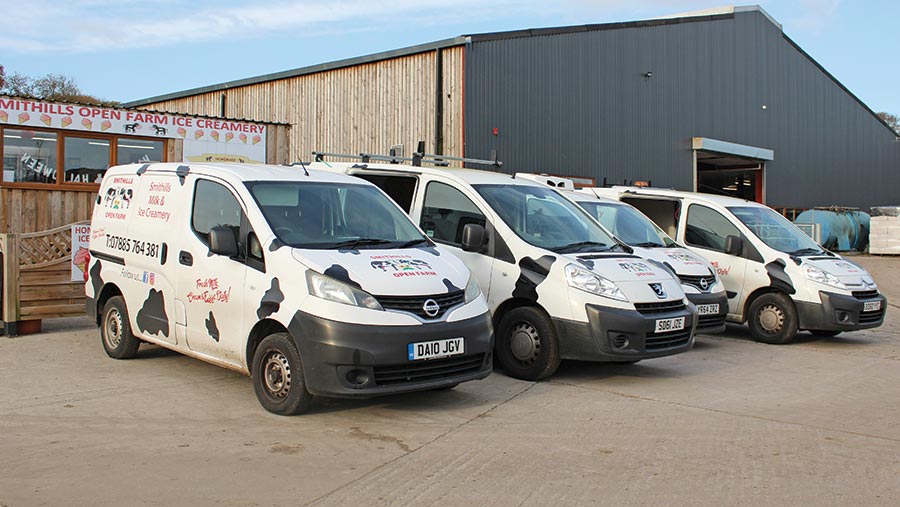
The growth has come entirely from social media, word of mouth and leafleting. They have never paid for any advertising.
Carl says: “Our business survives on Facebook. I used to be against Facebook, but I gave in and it has taken over. Most of our enquiries come via Facebook rather than email.”
Leafleting has also helped. Rather than just posting glossy leaflets through the door, every leaflet is put into an envelope and sealed with a Smithills Open Farm sticker.
“We have a better open rate doing that as people don’t know what’s inside, so they are more likely to look and read the leaflet.
“In the Horwich area, for every 100 leaflets we posted, we got three customers, which is great.”
They have also held a couple of open evenings attracting more than 1,000 visitors, with customers able to see the cows and the bottling process and sample some of the produce.
Target customers
The demand for doorstep deliveries hasn’t just come from pensioners, as one might expect. Encouragingly, most of the interest is coming from younger generations.
Carl says: “We don’t target the traditional older customer, who wants their milk in pint bottles and to pay by cash, it is the modern shopper we are targeting.
“It is the shopper who uses the internet and 95% of our money is collected by bank transfer.”
By targeting the cutting-edge consumer, Carl and his dad opted to use glass litre bottles with a screw lid rather than the traditional glass pint bottles.
He says: “Our bottles are unique and are one of the big selling points for us as they are more practical – the milk stays fresher and they are environmentally friendly as the bottles can be reused.
“When we first started processing our own milk, we did use plastic, but we soon realised that wasn’t the road we wanted to go down.”
Carl reckons the demand for doorstep delivery has also come from consumers wanting to know where their food comes from.
He adds: “We have a lot of visitors to the farm and that is a big selling point for us as they can see how well the cows are looked after and they know exactly where their milk is coming from.
“We also have a good reputation for customer service. We want to deliver what they want and when they want it.”
Setup costs
As a result of using the unique litre glass bottles, a lot of the processing equipment has had to be adapted.
The processing plant cost between £150,000 and £200,000 and has been designed so visitors to the open farm can see the bottling process.
They are bottling some pint bottles in addition to the litre bottles in order to retain the existing customers they inherited from the milk round they bought.
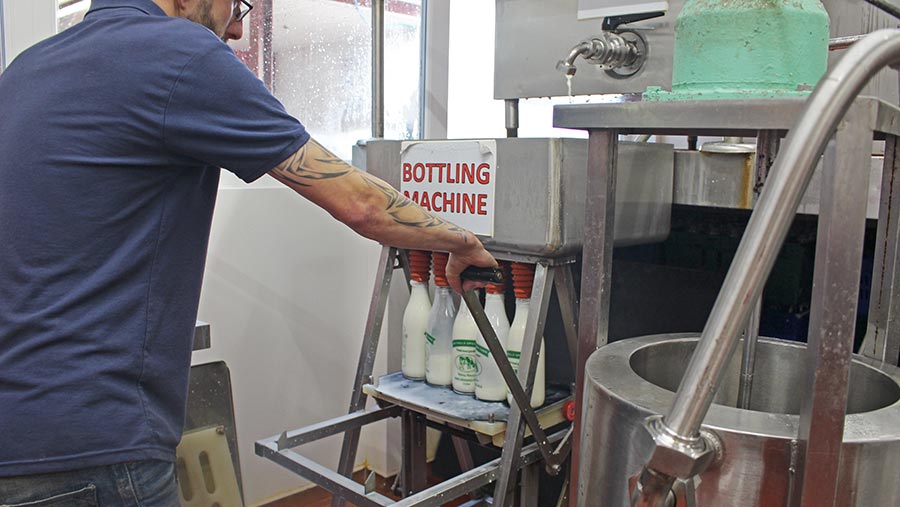
They are bottling about 1,200 litre bottles and 800 pints every other day.
Each week they are also making about 130 packs of 250g butter, 100 litres of cream and 50 litres of ice cream just for doorstep delivery.
They are selling 360 dozen eggs and 500 bottles of fruit juice, too.
Producing their own yoghurt and cheese is their next big move, planned in the coming few months, all driven by customer demand.
Want to get your business on the map?
Send your details to us and join other farmers on our Milk map: Where to buy milk direct from farm
Benefit to the wider business
There is minimal waste at the farm as any milk, butter or cream that isn’t sold can be used in the café for food and drinks.
They are also increasing the processing capacity by installing a new automatic bottling machine.
This will double capacity from the current 2,000 litres, will save time bottling milk and will also allow the open farm visitors to see the bottling every day instead of every other day.
Carl adds: “We will use the hand filling machine just for the pints and the automatic filling machine for the litre bottles. That will save at least two hours a day.
“We plan to move on to bottling milk every day. This means the milk will be even fresher and visitors to the open farm will also be able to see the milk being bottled daily.”
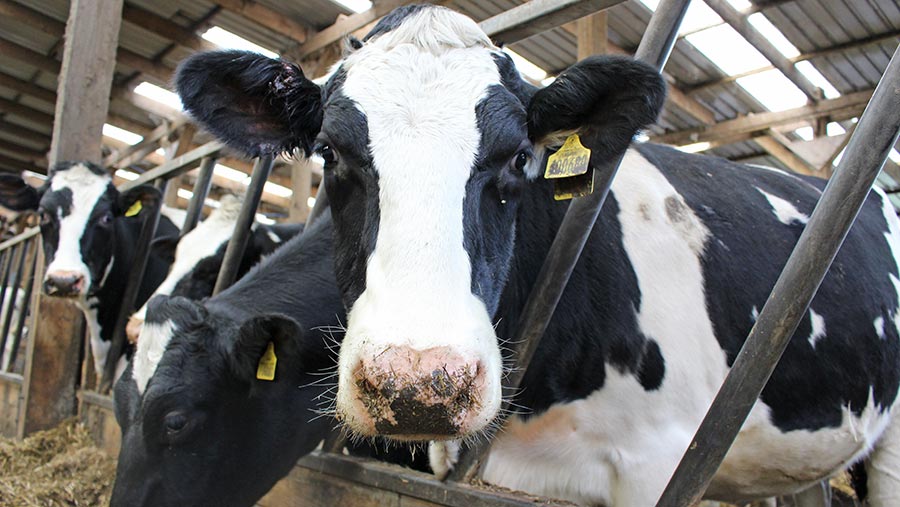
Currently, the farm is producing about 22,000 litres of milk a week from the 120 pedigree Holstein cows they are milking three times a day.
About 14,000 litres of that is sold to Yew Tree Dairies and the rest is processed on the farm.
They are receiving 25.5p/litre from Yew Tree, but their end goal is to process and sell all the milk off the farm on to the doorstep.
Currently, the doorstep milk is being sold at £1.20/litre delivered.
Staffing the milk round and the processing of the milk is one of the biggest costs.
There are eight drivers and the plan is to get a relief driver to cover any holidays and illness.
There are also two people working in the processing plant – one office worker plus Carl and Louise.
